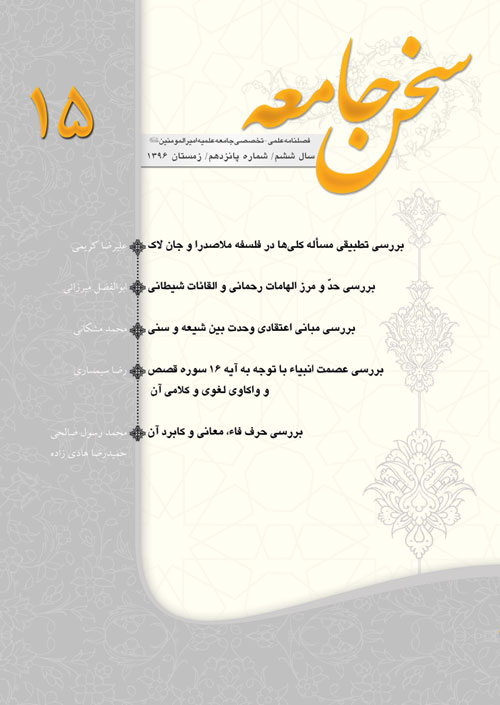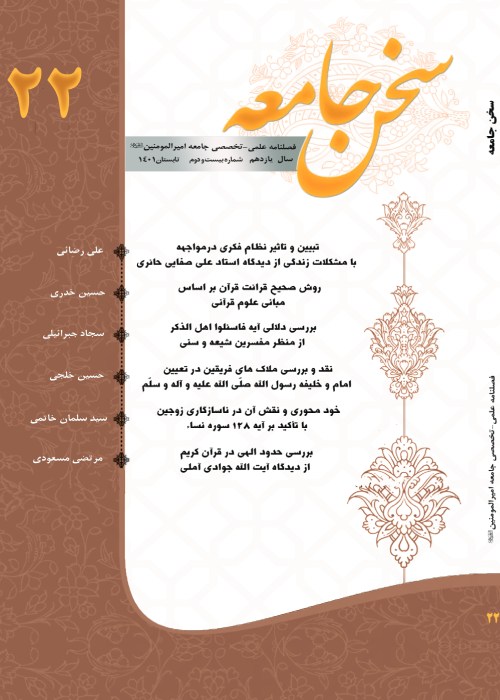فهرست مطالب

فصلنامه سخن جامعه
پیاپی 15 (زمستان 1396)
- تاریخ انتشار: 1397/01/20
- تعداد عناوین: 6
-
صفحه 5
-
صفحه 81
-
Page 7The generality issue is one of the old philosophical matters that is discussed, in all times and eras, by considering the time’s requirements by philosophers. The main issue of these discussions, generally, is about the general ontology, in the world, and if the generality is in the world? There are three general views to respond this question, that are realism, imagination and naming. From the realist point of view, the generality is externally existing in the world. Realism, itself, is also divided into two general Platonic and Socratic trends, which the Platonists believe that in the external world, world of ideas, and world of wisdom, there is generality as a tangible matter or sample. And from the Socrates’s point of view, the generality is not in the world of wisdom but also exists in external in general samples. As the issue of generality is an extended issue, this paper attempts to examine this issue from the perspective of two prominent philosophers,i.e Mulla Sadra, an existential Muslim philosopher and John Locke, an empirical English philosopher. Both of these two philosophers believe in general existence in the world, both of which can be called realistic. From Mulla Sadra’s point of view, the soul, because of its ascension and uprising, can observe generalities in the wisdom closely or far, for this he could be called Platonic dialectal followers. And, from John Locke’s point of view, there are generalities not in the world of wisdom but also in general samples, and the human’s wisdom imagines the generalities with respect to the similarities and commons of the general samples.Keywords: Mulla Sadra, Locke, generalities, realism, imagination, nominalism, abstraction, improvement
-
Page 19Determining of limits of divine inspirations and satanic induces, is a matter which needs to respond questions such as existence of these regulations, content and form and quality of them, and necessity of their separation. There is no historical background for this subject, but Alameh Taba’taba’ee provided this issue, while debates for Satan and inspiration and etc. is very old. The author seeks to these two fields, in library approach and studying concerned books, by studying in their common issues such as terminology, sorts, quality, audiences and etc. to determine their differences and limits. Findings show that heaven inspirations require a special capacity, and these inspirations have levels themselves. Satanic induces are opposite of heaven inspiration, and Satanic inspirations couple with human wills, and both of them divert people from perfection, and receiving capability would be made more simple, in addition to receiving of satanic orders, in this kind of inspirations, truncate a piece of peoples’ wills, and enter them into Satan and his companions’ monarchy; this is a huge danger itself, and if a induced person doesn’t come out from this neglect, in addition to his disobedience, he could affect others too. We, here, try to clarify some controversies on these two inspirations theoretically.Keywords: Heaven inspiration, Satanic, Infiltration of Satan, Revelation, Satan (devil), Heaven orders
-
Page 51In the present era, unity is one of the most important needs of the Islamic society, and it is necessary to examine the foundations of the belief of this important need in order to provide a solution for unity. In this article, in order to clarify foundations, the essence, and meaning of unity and coherence of Islam is expressed at first, that is attention to the common issues between religions beside disputes, and avoid of making creditable matter by enemy. the boundary of Islam, Also, is respected with the view that everyone who make declaration of Faith to Islam, his property and his honor are respected. In the issue of the bases of unity, first, the common issues between religions, as the common basis and principles, are considered; and it is natural that these principles are the same definitive issues of religion that the violation of these issues is the departure of the Islam. Another basis for unity are verses of the holy Qur’an. In this section the reasons of disagreements that are caused mostly by difference in opinion is, differences in ijtihad, and disputes due to the personal pleasures and personal preferences of them, are studied at first; Since the more discussion on difference, i.e. opposite of unity, the more understanding about the unity and its bases. Finally, we have been helped by the utterings and practices of the infallible Imams (as) as another basis for unity. This paper was made in a library method.Keywords: nature of unity, disputes’ bases, dispute in opinion, unity in Holy Quran, unity in Islamic leaders’ practice
-
Page 65This paper seeks to prove the Prophets’ Infallibility according to Surah Al-Qasas 16, based on narrative and rational evidences, and also studies the possibility of infallibility’s existence and whether it is algebraic or not. At the first step, the term of infallibility is studied lexically, by using Persian and Arabic lexicons, and then Shi’a and Sunni commentators’ opinions for this verse are provided. And then different views about infallibility such as: 1- Theory of mercy 2- creation, (mood) 3- spiritual mind 4- wisdom complementation, are studied. Consequences of considering the infallibility as an algebraic matter, is one of the important issues in this article. The possibility of infallibility is discussed at last. This article is tried in library approach and studying concerned books and articles, and author could, by their detailed study, write titles briefly and with a little innovation.Keywords: Infallibility, Surah Al-Qasas 16, prophets, prophetMusa (P.H)
-
Page 81The word of “Fa’” is one of the basic Arabic words that has a high application in Arabic texts. If we want to mention roles of this word, we should classify its roles in following classes: 1- conjunction 2- Separation 3- tautology These three roles, albeit, are the most role, and some syntax scholars have suggested 10 roles for this word. It’s useful to explain the reason of trying this research and respond to this question what the advantage of reading this article is? The first matter is that we could achieve to a background for the approach of researching in Arabic literature, and state that: the respected reader, after reading, feels his syntax knowledge is improved and drawn a regular system in his mind. The system that attracts his attention to this matter, how much we can scrutinize in Arabic literature. It’s because of our many matters from a word of “Fa’”. It should be noted that, this research was tried by referring to references books of Arabic literature and comments of some syntax scholars, and somehow authors of this article’s point of views.Keywords: meaning of “Fa’” following conjunction separation


